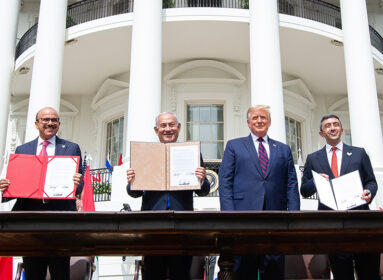“For over five years we have been…with Gilad Shalit.
Today, Gilad Shalit is with us” – IDF Brig. Gen. Yoav Mordechai
After 1,941 days in captivity at the hands of Hamas terrorists in Gaza, IDF soldier Gilad Shalit finally set his feet on Israeli soil for the first time on Tuesday morning, Oct. 18. Appearing gaunt and dazed, the 25-year old was transferred from Gaza to Egypt, as 477 Palestinian prisoners were simultaneously freed from Israeli jails. Another 550 prisoners will be released in two months, as part of a deal between Israel and Hamas, brokered by Egypt and Germany.
Shalit was turned over to Israeli officials at the Egyptian border and immediately escorted to an IDF base in the south, where he underwent a series of preliminary medical checks and called his family – their first contact in more than five years.
“I thought that I would find myself in this situation many more years,” a soft-spoken Shalit told Egyptian state television in a brief interview just before he was whisked away into Israel. “If they wanted to secure my freedom, they had to pay a price for this.”
Less than an hour after the IDF soldier’s return to Israel, he was flown by military helicopter to an air force base in Tel Nof, near Rehovot, for an emotional reunion with his family: parents, Noam and Aviva, siblings Yoel and Hadas, and grandfather Tzvi.
As he stepped off the plane, he was greeted by Prime Minister Benjamin Netanyahu.
“How good that you have returned home,” Netanyahu told Shalit.
Soon after, Shalit and his family left for their home in Mitzpe Hila in northern Israel, as thousands of well-wishers lined the roads holding flowers and waving Israeli flags.
According to a public opinion poll released after the prisoner swap was announced, an overwhelming number of Israelis approved the deal, despite fears that it would lead to increased terrorism. The Dahaf Institute poll found that 79 percent of Israels backed the deal with only 14 percent opposed. The majority was reported to be even larger among women – with 86 percent supporting the deal.
Many of those opposed to the deal were the families of the victims of Palesinian terror. In an attempt to quash the deal, opponents of the swap presented several petitions to Israel’s High Court of Justice. The petitions were considered and then rejected by the court.
Still, on the eve of Tueday’s swap, Netanyahu expressed his empathy for the families of terror victims, many of whom watched those who murdered their family members go free.
“I write you with a heavy heart,” said Netanyahu in a letter to the families. “I understand and know your pain,” adding that the decision to agree to a swap was “one of the most difficult I have made.”
JNF invites you to plant a tree for free in honor of Gilad Shalit.








 Southern New England Jewish Ledger
Southern New England Jewish Ledger












